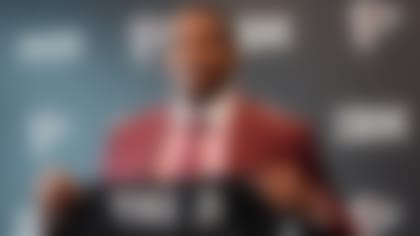All signs point to a sequel of last year's trade tsunami. Before getting to the players who could be moved over the coming weeks, let's take a look at the conditions which point to a bigger wave coming this time around.
There is more cap space across the NFL than teams know what to do with.
Cap space is overrated. All but six teams have at least $15 million in space, according to Over The Cap, with nearly half the league over $30 million. All this room exists before the deluge of cuts and restructured contracts that will open up even more cash. When nearly every team has an advantage, it's no longer an advantage. Teams like the Eagles and Rams have shown that even organizations that spend close to the cap can easily maneuver their finances while staying aggressive. If your favorite team's decision-makers are using cap space as an excuse for inactivity, they are either uncreative or incompetent.
Veterans who no longer fit on their current teams still have attractive contracts.
One team's bloated contract is another team's opportunity. The rapid change in coaching staffs and front offices makes a lot of large recent deals look like values to other teams.
This is true for a few reasons. As the salary cap continues to skyrocket with television money washing over the league, even highly paid veteran starters could probably do better on the open market. DeSean Jackson, for instance, has $10 million left on the final year of his deal. That sounds significant until you consider he might be the best free-agent receiver available if he were released.
Antonio Brown is another case. The Steelers already paid Brown his huge signing bonus, so any team trading for him inherits a contract that pays him an average salary under $13 million over the next three years. Brown has made noise about wanting new guaranteed money -- who wouldn't? -- but he might not have a choice in the matter.
A road map from the best teams in the league.
I wrote in January of 2018 about how the Eagles and Patriots were the most active trading teams this decade. The Rams were the most high-profile team to use veteran trades to build the roster last offseason, picking up Marcus Peters, Aqib Talib and Brandin Cooks for draft picks. The Patriots gave up very little to acquire key championship contributors like Trent Brown, Jason McCourty, Cordarrelle Patterson and Danny Shelton via trades. Those low-cost deals are close to NBA-style contract dumps for players on the way out, with the Patriots and other teams picking out targets to nab from opposing rosters.
In this copycat league, more teams are likely to follow suit. The Browns picked up Jarvis Landry, Damarious Randall and Tyrod Taylor in trades last season, rather than risking the free-agent market.
Position scarcity in free agency.
It's nearly impossible to find a quality offensive lineman in free agency. The same is true for starting tight ends or No. 1 wide receivers. Attaining such upgrades outside of the draft takes creativity or huevos, like when the Cowboys dealt a first-round pick for Amari Cooper last season. It doesn't hurt that so many of the big trades favored the bold. Ultimately, a higher caliber of player could be available in trades rather than free agency.
While sequels rarely live up to the original, Trade Twonami (name credit goes to the Twitter GOAT Patrick Claybon) should stand the test of time. The annual increase in NFL trades is just part of the world we live in now, like rising sea levels and "Fast and the Furious" movies. Get used to it.
With all of that in mind, here are some names to watch as potential trade targets over the coming weeks:
Logical targets
Antonio Brown, Steelers wide receiver: I don't accept the notion that Brown is untradeable or lacks value. Concerns about Brown's off-field problems and attitude are significant, but he's still a future Hall of Fame wide receiver playing near the top of his game. As mentioned above, his contract should make him more attractive. So should his well-known maniacal work ethic, which results in short area quickness making him open anytime he sniffs single coverage.
Of course there are red flags here and Brown is 31 years old. But he's still a superior player to Amari Cooper and Brandin Cooks, who both fetched first-round picks in trades last year. NFL teams have looked past far worse problems than those facing Brown this offseason in the name of talent. The barren free-agent wideout market could inspire a trade during March, but it may take until draft week for the Steelers to get fair value for Mr. Big Chest from a team like the 49ers or Jets.
DeSean Jackson, Bucs wide receiver: D-Jax is likely to be dealt or stay with the Bucs because his contract is too good to simply cut. When Bruce Arians came aboard in Tampa, he mentioned he wanted to "re-recruit" Jackson in an effort to appease the veteran, who has been open about his desire to play elsewhere.
A one-year, $10 million contract is more than fair for the reigning league leader in yards per reception, and the short-term nature of Jackson's deal is an asset to a trade, not a detriment. The Bucs have Mike Evans and Chris Godwin locked in on the outside and could use the money saved in a Jackson trade to re-sign slot receiver Adam Humphries. The Eagles and Patriots are both logical suitors for Jackson, the youngest 32-year-old in the league.
Ryan Tannehill, Dolphins quarterback: If Joe Flacco and his contract can nab a fourth-round pick, don't discount the chances of Tannehill attracting some attention for late-round picks. The Redskins could make sense in exchange for a late-round pick or possibly the Jaguars as a bridge quarterback to a rookie to be named later. Tannehill is due nearly $19 million in 2019, roughly what the Broncos paid Case Keenum last year.
John Ross, Bengals wide receiver: The new regime in Cincinnati clearly doesn't have much use for Ross, who is on the market according to NFL Network Insider Ian Rapoport. It's hard to imagine Ross getting more than a late-round pick in return after two unimpressive seasons, but teams are often stubborn to ditch their college evaluation.
Nick Foles, Eagles quarterback: I've written so muchabout Foles that there's no need to repeat myself here. The closer free agency gets, the more I'm skeptical Foles will inspire a trade. The franchise tag makes it complicated and even the Jaguars appear more likely to wait for him to hit free agency, especially if he makes it difficult for the Eagles to trade him.
UPDATE: Eagles GM Howie Roseman announced at the combine the team would not franchise tag Foles, meaning he will become a free agent at the start of the new league year.
Jahleel Addae, Chargers safety: As the Chargers' playoff win over the Ravens showed, the team has plenty of safeties. Addae could potentially offer starter snaps for a cheap price.
Kenny Stills, Dolphins wide receiver: For a while, the debate in Miami was whether the team should commit to Stills, DeVante Parker or Jarvis Landry. Now they could all be gone. After previous decision-maker Mike Tannenbaum rewarded Stills with a three-year deal last offseason, the deep threat gained only 553 yards in 2018. That lack of production was hardly all Stills' fault, but a new staff in Miami may want a fresh start at the position. He's "only" due $14 million combined over the next two seasons, which would make him attractive in a trade.
Shaq Lawson, Bills defensive end: Inconsistent first-round picks with looming fifth-year options are strong candidates for cheap trades in today's NFL.
Haason Reddick, Cardinals linebacker: A first-round pick who has struggled to find playing time, Reddick is slated to play under his third defensive coordinator in as many years. That's a recipe to be dangled on the open market.
Jamie Collins, Browns linebacker: Rumored to be available at the trading deadline last October, Collins seems more likely to be released rather than traded. But if the Browns are ready to let him go, they should call around the league to see if there are any takers.
Long shots
Gerald McCoy, Bucs defensive tackle: Rick Stroud of the Tampa Bay Times reported last week that the Bucs plan to keep McCoy at his $13 million salary. It makes sense because McCoy's talented enough to work in any system and the price is commensurate with his value. Still, an interested team could see the Bucs' ambivalence as an opportunity. With this probably being McCoy's last year in Tampa, perhaps the Bucs would entertain dealing McCoy for a decent draft pick.
Jerry Hughes, Bills defensive end: One of the best acquisitions by the Bills this decade, Hughes was stolen from the Colts in exchange for Kelvin Sheppard back in 2013. Six years later, Hughes is still the Bills' best pass rusher, still likely to rack up more consistent pressure than his sack totals indicate. But at 30 years old with a $10 million cap figure, the Bills could potentially listen to offers if another team was willing to give up a draft pick.
Nelson Agholor, Eagles wide receiver: Agholor is a perfect example of a player that would never be a trade candidate in the past but could be an under-the-radar option now. He's due $9.3 million on the fifth-year option of his rookie contract, a figure I suspect the Eagles will pay if they can't find a better replacement in the coming weeks. But if the team chooses to jump in the Antonio Brown sweepstakes or sign a player like Jamison Crowder, Agholor's contract may be attractive to another team that treats the terms as a "prove-it deal."
Karl Joseph and Gareon Conley, Raiders defensive backs: On paper, Joseph and Conley's solid finishes to last season should make them players for Jon Gruden to build around. But both Reggie McKenzie first-round picks were reportedly dangled at the trade deadline last year and could be swept out if new GM Mike Mayock wants to continue housecleaning. Even after Joseph's uptick in play, he seems like a long shot to get his 2020 fifth-year option picked up.
Jacoby Brissett, Colts quarterback: I don't believe Brissett will get dealt because there aren't that many teams looking for quarterbacks and he's worth plenty to the Colts as a quality backup to Andrew Luck. Why bother dealing Brissett if the Colts could only get a fourth-round pick or worse in return? And why give up a premium pick for anyone not named Nick Foles when there are passable options like Tyrod Taylor or Teddy Bridgewater in free agency?
Justin Houston, Chiefs defensive end: Houston is more likely to be released rather than traded with $15.25 million in salary due this year. But he would be one of the better pass rushers to hit the open market and it's possible a team -- and there appear to be some with real interest -- would give up a late-round pick to not have to bid against other teams for him.
Marcell Dareus and Malik Jackson, Jaguars defensive linemen: Jackson is a strong bet to be released or traded, with any interested teams more likely to wait out the Jaguars rather than pay him the $13 million he's due in 2019. Dareus is more likely to remain a Jaguar, although it's possible he could be dealt twice on the same contract the Bills signed him to way back in 2015.
Michael Brockers, Rams defensive tackle: This is admittedly a shot in the dark. Brockers is a rock solid leader on the Rams' defensive line, but it's possible they could look to save roughly $10 million in cap space if they choose to spend big dollars elsewhere on defense this offseason. If the team could find a deal for Robert Quinn last year, then Brockers could possibly fetch the Rams a pick, too.
Follow Gregg Rosenthal on Twitter @greggrosenthal.












